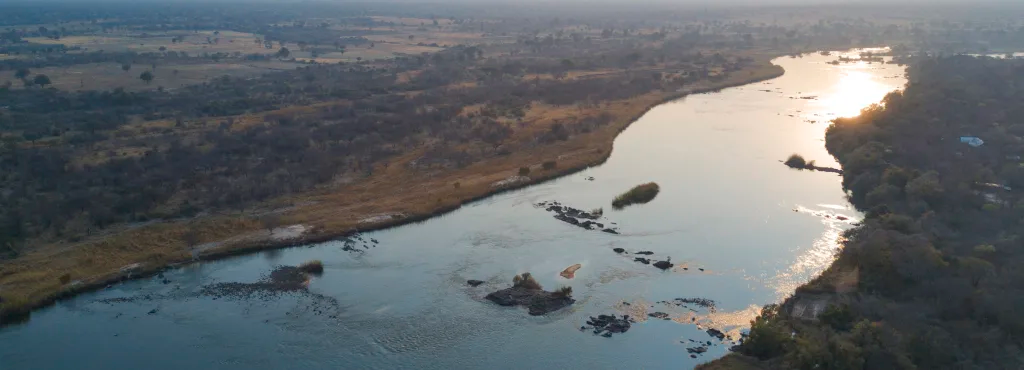Canada-based oil and gas company ReconAfrica, which has been exploring for oil in Namibia’s Kavango regions since 2021, has paused all operations in the country. National Geographic broke the news June 28.
“This shows the power of the collective,” said Reinhold Mangundu, a Namibian activist who penned an op-ed with Prince Harry, the Duke of Sussex about ReconAfrica’s exploration for oil in 2021. “The fears expressed by local communities and passionate conservationists were not unfounded, for they recognized the peril that loomed over the wildlife, waterways, and the very lives and dreams of those who call this land home. In this moment, we dare to envision a future where sustainable and responsible practices prevail, where the harmonious coexistence of humanity and nature takes precedence. May this be a wake-up call for the government to consider new pathways to a just and sustainable future. The seeds of change are there, we just need to combine them through new paradigms of progress, where the well-being of the region’s people and the delicate tapestry of its biodiversity are cherished and safeguarded for generations to come.”
ReconAfrica has a 13,200-square-mile lease area spanning Namibia’s Kavango regions and the western side of the Okavango Delta in Botswana. International organizations, including Re:wild, have supported the call from civil society organizations, local communities and local activists for an immediate and permanent moratorium on oil exploration in the Okavango River Basin since October 2021. They have urged the Namibian government to instead invest in economic development that benefits local communities and wildlife for the long-term.
“We repeat our call for a moratorium and full public enquiry into the exploration activities of ReconAfrica, supported by over 120 civil society organizations in Namibia,” said Liz Frank of the Women’s Leadership Centre. “We support the right of local communities, including indigenous San communities, to free, prior and informed consent on all matters relating to their lives and livelihoods, including the right to say no to the destruction of their environment by corporations. The affected communities were never properly informed and consulted, and opposition by community leaders and activists has been quelled.”
ReconAfrica’s exploration for oil has been embroiled in controversy in Namibia. In July 2022, local communities from Namibia’s Kavango regions brought a legal case against ReconAfrica in the country’s High Court, asking the minister of environment and tourism to review or rescind the company’s environmental clearance certificate.
The local communities’ request was rejected and it is possible they may be required to pay the government and ReconAfrica’s legal fees, which could total nearly USD$35,000, a punitive amount for communities who make their living from subsistence agriculture.
“ReconAfrica is leaving after insiders enriched themselves with tens of millions of dollars,” said Rinaani Musutua, trustee with the Economic and Social Justice Trust in Namibia. “They said they cannot afford to drill again unless they get a partner. Who will come to partner with a company with such a bad reputation? The company has disrespected the laws of Namibia and fails to treat people with dignity. Government must ensure that ReconAfrica pays a bond to cover the cost of cleaning up their toxic waste pits and that the company compensate the families harmed.”
Evidence at the end of 2021 showed that the company had bulldozed a forest area the size of five football fields and then drilled illegally inside the Kapinga Kamwalye Community Conservancy, a protected area in Namibia’s ecologically sensitive Kavango regions. The company did so without permission from the conservancy’s leadership or the communal land board, as required by Namibian law.
Civil society organizations and activists have expressed concern that the wastewater from ReconAfrica’s exploratory drilling risks leaking into the groundwater and ephemeral rivers upstream of the Okavango River and Delta in Botswana, which provides drinking water for more than 250,000 people in a region especially prone to droughts, exacerbated by the climate and biodiversity loss crises.
“This is hugely encouraging news for the communities of the Kavango region and the people of Namibia and beyond,” said Tim Davenport, Africa Director for Re:wild. “We applaud the commitment and dedication of all the groups who came together to fight for the rights of people and nature. We must all, however, continue to be vigilant.”
In addition to the people, hundreds of wildlife species depend on the freshwater rivers that feed the floodplains that make up the Okavango Delta, a Key Biodiversity Area, which is a place critical to the persistence of the planet’s biodiversity. The Okavango Delta is also the terminal sink of the river system and has no outflow to the sea. Any contaminants that enter the delta via this river system are impossible to remove and will become persistent pollutants which could significantly destabilize the fragile ecosystem upon which wildlife and local communities depend.
“ReconAfrica’s decision to halt operations is a powerful stride towards protecting the Okavango River Basin, a key biodiversity hotspot. The Amphibian Survival Alliance actively champions the conservation of such critical ecosystems. This situation highlights the pressing need for a future where the protection of our most vital biodiversity sites sits front and center. We urge the Namibian government to seize this opportunity, investing in sustainable economic development that benefits the local communities and the abundant wildlife in this region. Recognizing the Okavango River Basin as a Key Biodiversity Area commits us all to the preservation of our planet’s most valuable ecosystems for generations to come,” added Gina Della Tonga, Executive Director for the Amphibian Survival Alliance.
The international community will continue to join local activists and organizations in monitoring threats to the Kavango and the Okavango Delta, including ReconAfrica’s intentions to drill in Botswana.
Photo: An aerial view of the Okavango River on the border of Namibia and Angola. (Photo by Re:wild)

